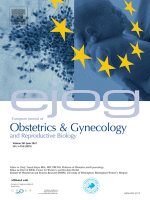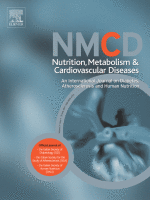Flaxseed
How to submit an article:
- Registered users can submit any published journal article that has a unique DOI (Digital Object Identifier) name or link to Research Hub.
- For example, you can paste the full DOI link:
https://doi.org/10.1109/5.771073or just the DOI name:10.1109/5.771073into the field above and click submit. - The person who is first to submit a valid article to Research Hub will forever be credited for it, and every article submission earns you +6 Research Points.
Published research studies are articles that present the findings of original research that has undergone a peer-review process and has been made publicly available in scholarly journals, books or other media.

Impact of phytoestrogens on treatment of urogenital menopause symptoms: A systematic review of randomized clinical trials
2021 Jun European Journal of Obstetrics & Gynecology and Reproductive Biology Abdi F, Rahnemaei FA, Roozbeh N, Pakzad R
Systematic Review Female Sexual Function Flaxseed Soybean MenopausePhytoestrogens, used in various forms, have shown improvement in urogenital menopause symptoms and improved women's sexual function, promoting overall quality of life.

The effects of foods on LDL cholesterol levels: A systematic review of the accumulated evidence from systematic reviews and meta-analyses of randomized controlled trials
2021 May Nutrition, Metabolism and Cardiovascular Diseases Schoeneck M, Iggman D
Systematic Review Turmeric Walnut Avocado Tumeric Almond Green Tea Tomato FlaxseedConsumption of certain foods like rapeseed/canola oil, avocados, and turmeric can lead to moderate to large reductions in LDL cholesterol levels.
Research insights are moderated by the Research Hub team and offer an at-a-glance overview of interesting research findings.

2021 European Journal of Obstetrics & Gynecology and Reproductive Biology
Phytoestrogens, used in various forms, have shown improvement in urogenital menopause symptoms and improved women's sexual function, promoting overall quality of life.
Systematic Review Female Sexual Function Menopause Soybean
Impact of phytoestrogens on treatment of urogenital menopause symptoms: A systematic review of randomized clinical trials
Abdi F, Rahnemaei FA, Roozbeh N, Pakzad R

2021 Nutrition, Metabolism and Cardiovascular Diseases
Consumption of certain foods like rapeseed/canola oil, avocados, and turmeric can lead to moderate to large reductions in LDL cholesterol levels.
Systematic Review Almond Avocado Green Tea Tomato Tumeric
The effects of foods on LDL cholesterol levels: A systematic review of the accumulated evidence from systematic reviews and meta-analyses of randomized controlled trials
Schoeneck M, Iggman D
Review Articles
Review articles summarise and critically evaluate the current state of research on a specific topic or field by synthesising multiple primary research studies.

Impact of phytoestrogens on treatment of urogenital menopause symptoms: A systematic review of randomized clinical trials
2021 Jun European Journal of Obstetrics & Gynecology and Reproductive Biology Abdi F, Rahnemaei FA, Roozbeh N, Pakzad R
Systematic Review Female Sexual Function Flaxseed Soybean MenopausePhytoestrogens, used in various forms, have shown improvement in urogenital menopause symptoms and improved women's sexual function, promoting overall quality of life.

The effects of foods on LDL cholesterol levels: A systematic review of the accumulated evidence from systematic reviews and meta-analyses of randomized controlled trials
2021 May Nutrition, Metabolism and Cardiovascular Diseases Schoeneck M, Iggman D
Systematic Review Turmeric Walnut Avocado Tumeric Almond Green Tea Tomato FlaxseedConsumption of certain foods like rapeseed/canola oil, avocados, and turmeric can lead to moderate to large reductions in LDL cholesterol levels.
Clinical Trials
Clinical trials are research studies that involve people and are conducted to evaluate the safety and efficacy of new treatments or interventions, such as drugs, medical devices, or behavioural therapies.
Study Protocols
Published study protocols are detailed plans that outline the objectives, methodology, statistical analyses, and organisation of a research study that have been made publicly available for others to review and use as a reference.
Presentation Slides

Systematic Review
Phytoestrogens, used in various forms, have shown improvement in urogenital menopause symptoms and improved women's sexual function, promoting overall quality of life.
Abdi F, Rahnemaei FA, Roozbeh N, Pakzad R

Systematic Review
Consumption of certain foods like rapeseed/canola oil, avocados, and turmeric can lead to moderate to large reductions in LDL cholesterol levels.
Schoeneck M, Iggman D
Executive Summary
Write an executive summary in the form of a blog article on the topic of "Research into Chinese medicine treatment for Flaxseed" summarising the research below and using language that can be easily understood by patients and avoiding medical jargon using a professional and caring tone of voice.
Write an executive summary in the form of a blog article on the topic of "Researched Chinese medicine treatments for Flaxseed" summarising the research below in an objective and easy to understand way, and using language that can be easily understood by patients. Group the article into Chinese medicine treatments first, followed by nutrition and other treatments. Avoid using medical jargon and use a professional and caring tone of voice.
Write me a concise but easy to understand executive summary on the topic of "Chinese medicine treatments for Flaxseed" based on the following research that I will give you. Your summary should be 2 paragraphs long in Australian English spelling and include references to the studies.
A Systematic Review published in 2021 in the journal European Journal of Obstetrics & Gynecology and Reproductive Biology found that Phytoestrogens, used in various forms, have shown improvement in urogenital menopause symptoms and improved women's sexual function, promoting overall quality of life. A thorough and systematic review was conducted on databases including PubMed, EMBASE, Web of Science, Cochrane library, Scopus and ProQuest, spanning from the years 2000-2020. The focus was solely on randomized clinical trials. An evaluation of the quality of selected papers was carried out using the CONSORT checklist. In total, 33 high-quality papers were reviewed which discussed the different forms and uses of phytoestrogens. The results of this systematic review reveal that phytoestrogens including Pueraria Mirifica, fennel, Hop plant, Glycine Max, soy, red clover, black cohosh, ginsing, cimicifugaracemosa, genistein, diadzein, glycitein and isoflavone, used as various products such as oral capsules, pills, food supplements, enriched powders, vaginal gels, creams and suppositories, improved menopausal urogenital symptoms. Particularly, the recovery rate was found to be higher when these were applied vaginally. Further implication of these findings is the enhancement of women's sexual function following treatment, validating the use of phytoestrogens as a safe, low-risk and accessible method to alleviate urogenital symptoms.
A Systematic Review published in 2021 in the journal Nutrition, Metabolism and Cardiovascular Diseases found that Consumption of certain foods like rapeseed/canola oil, avocados, and turmeric can lead to moderate to large reductions in LDL cholesterol levels. The research was carried out by conducting a systematic evaluation of existing guidelines, systematic reviews, and Randomised Control Trials (RCTs); we have only referred to the latter for studies on coffee intake. This was done on databases such as PubMed, Cochrane Database of Systematic Reviews, and Cochrane Central Register of Controlled Trials, alongside a search on the Trip database for guidelines. The time frame for the study was from its inception up until June 2019 and October 2019 respectively. Studies were included if they were at least 13 days in duration and were in English. Using the Grading of Recommendations Assessment, Development, and Evaluation (GRADE) method, 37 guidelines, 108 systematic reviews, and 20 RCTs were evaluated to analyze the strength of evidence in the context of food impacts on LDL cholesterol levels. The results of the research reveal that foods high in unsaturated and low in saturated and trans fatty acids such as rapeseed or canola oil, those with added plant sterols/stanols, and those high in soluble fibre like oats, barley and psyllium cause moderate reductions in LDL cholesterol. A moderate to a large increase was observed with unfiltered coffee though. Soy protein, tomatoes, flaxseeds, and almonds cause small reductions. Meanwhile, foods like avocados and turmeric cause moderate to large reductions with a moderate level of evidence supporting this observation. Other foods like pulses, hazelnuts, walnuts, high-fiber/wholegrain foods, green tea result in small to moderate reductions, and sugar causes a small increase. Several foods identified were either neutral or had low or very low evidence regarding their effects on LDL cholesterol levels.
Moderation Tools
Topic
Sign In
Users not signed in are limited to viewing the 5 most recent items of content.